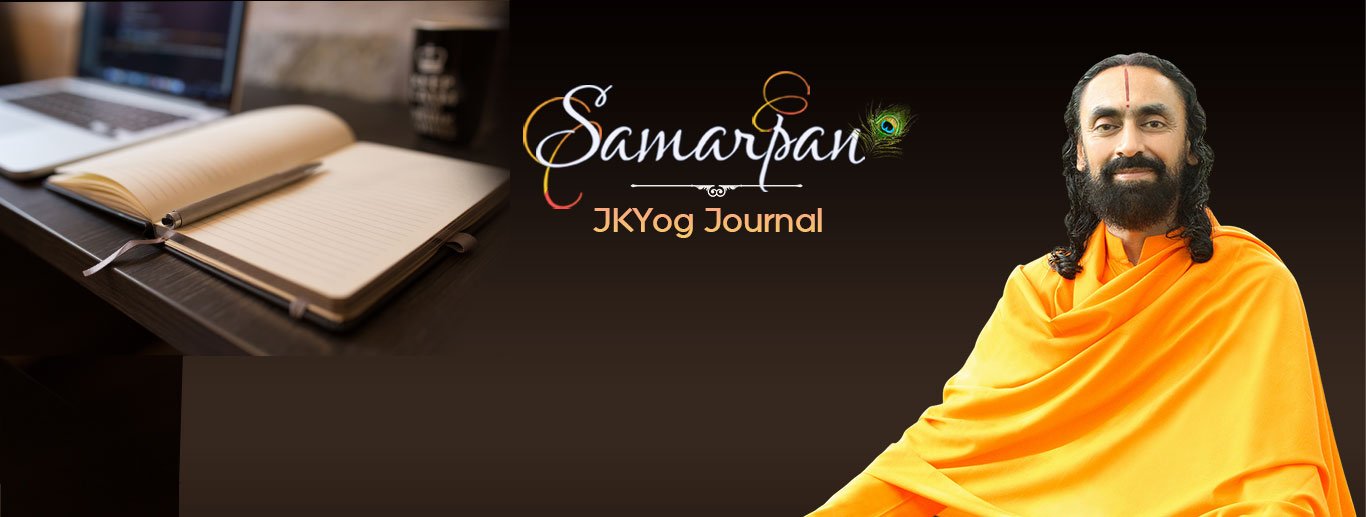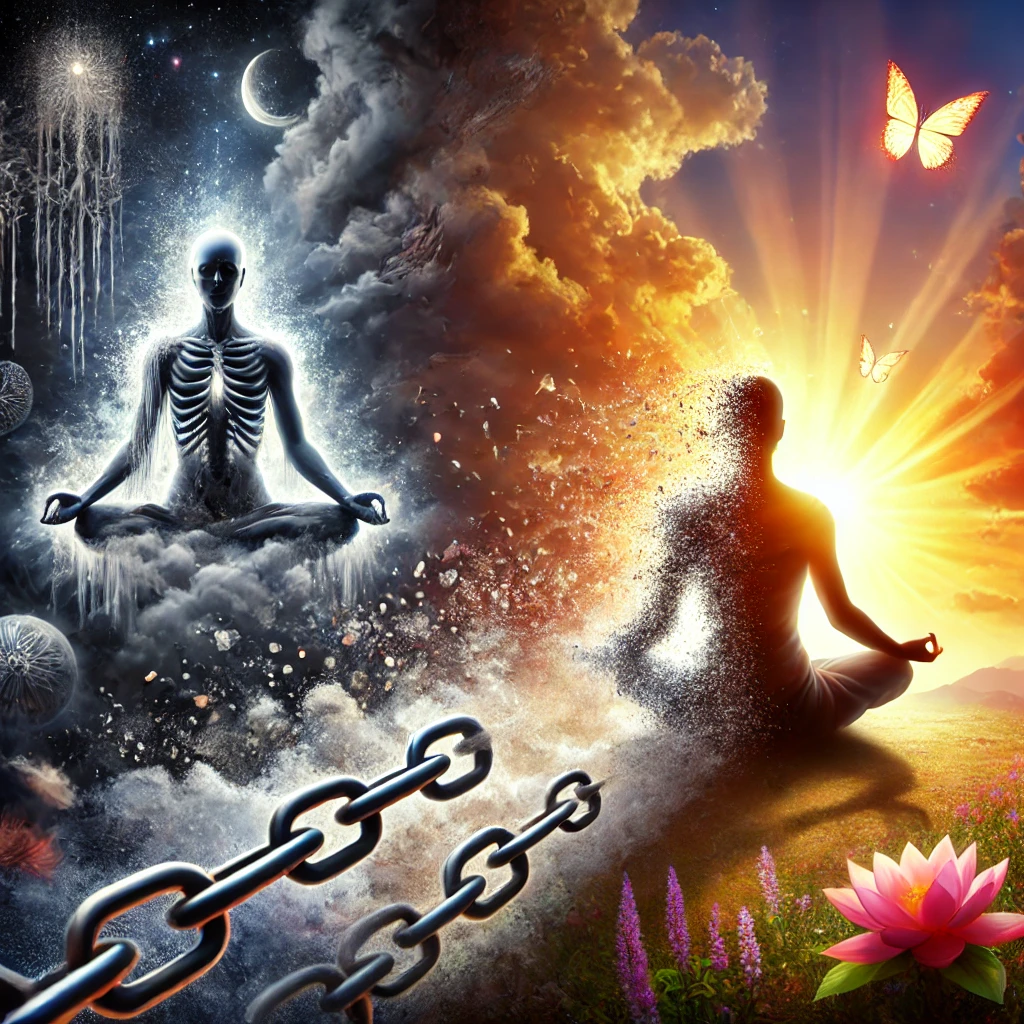Becoming Fearless

Becoming Fearless
 Quote
Quote
यस्मान्नोद्विजते लोको लोकान्नोद्विजते च य: |
हर्षामर्षभयोद्वेगैर्मुक्तो य: स च मे प्रिय: || 15||
yasman nodvijate loko lokan nodvijate cha yah
harshamarsha-bhayodvegair mukto yah sa cha me priyah
Those who are not a source of annoyance to anyone and who in turn are not agitated by anyone, who are equal in pleasure and pain, and free from fear and anxiety, such devotees of Mine are very dear to Me
 From the Editor's Desk
From the Editor's Desk
Fear is a powerful emotion that often drives our actions, whether through fight, flight, or freeze responses. While certain fears protect us, others limit our potential and drain our mental energy. Understanding the roots of fear will help us become fearless.
This month’s Inspiration delves into the different types of fear, their causes, and the spiritual practices we can adopt to overcome them. By developing detachment, accepting the will of God, and understanding the eternality of the soul, we can transform fear into a stepping stone for spiritual growth.
 Bhakti Ras
Bhakti RasBecoming Fearless: Strategies to Overcome Fear
We all have experienced many different types of fears from childhood to adulthood. While some types of fear are healthy and push us into action, others can be debilitating, paralyzing us, or draining our internal resources. Drawing from Vedic knowledge, we can use this wisdom to understand the roots and ultimately let go of fear.
Different Types of Fear
Fear is an instinctive emotion we experience when faced with a real or perceived threat to our physical, emotional, or psychological well-being. It prompts one of four responses: fight, flight, freeze, or face the situation. From an evolutionary perspective, fear serves an important function—it keeps us safe from harm. However, the challenge arises when fear becomes irrational or persistent, leading to unnecessary suffering.
Some common fears include fear of failure, social rejection, financial insecurity, losing loved ones, or natural disasters. Others may develop into phobias or psychological conditions like PTSD, which require intervention. Even devotees on the spiritual path may experience fears related to their spiritual progress, such as fear of spiritual downfall or the consequences of past karmas.

Of all fears, the most universal is the fear of death, known in Vedic terms as abhinivesh or the fear of death. It is an instinct of the material intellect because we identify with our body, forgetting the soul’s immortality. This attachment to the body, and by extension the material world, fuels our fear.
Causes of Fear
There are many causes of fear. Many fears stem from childhood experiences or even past lives. For example, a fear of confined spaces (i.e., claustrophobia) may be linked to unresolved trauma. Other fears are driven by obsessive thought patterns—overthinking the possibility of failure or rejection leads to crippling anxiety.
The Bhagavad Gita (12.15) explains that memories of past pain and worries about future pain torment us more than present realities. Fear is heightened by uncertainty—when we do not know how long a challenging situation will last or what the outcome will be. This anxiety often stems from attachment to certain outcomes.
In his commentary on the Bhagavad Gita (16.1), Swami Mukundananda ji explains the cause for fear—attachment to an object, person, or anything else. Whether it is wealth, social prestige, or physical health, when we cling to external objects or relationships, we become afraid of losing them. Our identification with the body rather than the soul heightens these fears, particularly the fear of death.

Spiritual Strategies for Overcoming Fear
To overcome fear, we must first understand it and then apply spiritual techniques to transform our mindset. While psychological therapies, mindfulness, and practical preparations can alleviate some fears, Vedic wisdom provides profound tools for becoming truly fearless.
- Develop Detachment from Objects and People. People who are free from attachment are in harmony with the will of God and experience no fear or anxiety about losing anything. This detachment must extend even to our own body. By cultivating detachment, we can free ourselves from the fear of loss, whether it is material possessions, relationships, or physical health.
- Accept the Will of God. We must do our best in all situations but accept the outcome as God’s will. If we face challenges or painful consequences due to our past karma, we must have faith that everything is happening according to divine justice. By surrendering to God’s will, we can release our fear of the unknown and trust that the divine plan is always just and beneficial in the long run.

- Take Fear as an Impetus for Internal Purification. Fear can be an opportunity for spiritual growth. When faced with fears—whether it is loss of a position, loneliness, financial insecurity, or social rejection—we can choose to focus our minds on God instead of dwelling on negative emotions. Contemplation on divine names, pastimes, and virtues purifies the soul, elevating us beyond fear. This daily meditation brings peace and inner strength.
- Awareness of the Eternality of the Soul. Fear of death is perhaps the most deeply ingrained fear in all beings. Yet Shree Krishna teaches in the Bhagavad Gita (2.27) that death is certain for the body, but the soul is eternal. By deeply contemplating the soul’s immortality, we can reduce our attachment to the body and release our fear of death. Just as the body undergoes constant change throughout life, death is merely another transformation given that the soul is immortal. When we realize that we are not the body, but the soul, fear of death dissolves.
 Bal-Mukund: Playground for Vedic Wisdom
Bal-Mukund: Playground for Vedic Wisdom
The Weight of a Prayer
Once, a lady who was without an income had to find a way to feed her four hungry children and husband. Feeling extremely worried about her family, she rushed into a nearby grocery store and begged the owner to give her some groceries. The owner refused to give her any goods without payment as he needed to make a profit, and his store was not a charitable organization. The woman then requested him to give her a loan which she would repay later. The owner denied her request since she did not have a credit account.

A customer, who had tremendous faith in God, was listening to this conversation. He told the lady to write a prayer on a piece of paper and she did accordingly.
He took the paper and folded it without looking at it. He told the owner to put the paper on one side of the scale and let the lady weigh groceries against the weight of the paper. He offered to pay for any groceries that were beyond the weight of the paper. The lady started loading up the scale with groceries and no matter how many groceries she put, the scale did not tip over.
The shopkeeper was astonished when he saw this scene. He put the groceries in the bag and handed it to the lady.She thanked the customer and left.
The shopkeeper was left dumbfounded. The customer insisted on looking at the prayer. They opened the paper slip. The lady had written “Oh Lord! You know my needs. I am putting this in your hands.” The customer was thankful to have witnessed this incident. He made the payment for the groceries and left. Afterward, the shopkeeper discovered that the scales were broken.
Practical Wisdom:
- The lady prayed to God to take care of her needs when she had no other means to feed her family. Nobody knew the physical weight of the paper as the scales were broken. However, her prayer carried the weight of surrender that fulfilled her needs. Her action to surrender was the true antidote to her worry of being unable to feed her children. When one surrenders, one demonstrates faith in protection from God. Even if one cannot see God, one should always believe that God is watching and taking care of all living beings
 Youth Insights
Youth Insights
Overcoming the Fear of Judgment: A Lesson from Ashtavakra
Have you ever found yourself worrying about what others think of you? Many youth experience the pressure to act or look a certain way just to fit into their peer group. We all want to be accepted. However, in trying to meet the expectations of others, we tend to lose sight of our true identity.
All youth can learn a powerful lesson from the life of Sage Ashtavakra, King Janak’s Guru. The story of his life can shift our perspective on how to deal with the pressure to act or look a certain way.
Ashtavakra was born with physical deformities—his body had eight bends, which made him look different from others. Imagine how many people judged him based on his external appearance. Once when he entered the royal court of King Janak, all the scholars started laughing at him, made fun of his appearance, and dismissed him, even though he was the wisest among all the scholars present.
Amazingly, Ashtavakra did not let their opinions bother him. When people laughed at him, he didn’t shrink back in shame. Instead, he first chided them for their ignorance. Then he calmly asked them, “Are you laughing at my body or my soul?” This question changed everything. Ashtavakra reminded everyone that true worth comes from within, from our wisdom, character, and spirit—not from how we look or what others think of us.

Reflecting on Ashtavakra’s story, we may realize that we get so caught up in wanting to be accepted that we may even start changing ourselves or hiding parts of who we are, just to fit in a social group. Desperate to comport to someone else’s idea of what is considered to be “normal” or “cool,” we may lose our sense of self. To be more like Ashtavakra, we may need to equip ourselves with the divine knowledge of our true identity – we are not the body but the soul.
The next time you catch yourself worrying about what others think, ask yourself, “Am I being true to myself, or am I changing to fit in?”
When we embrace who we really are, we will not only feel more comfortable in our own skin, but we also inspire others to do the same. Together, we can create a community where everyone feels safe to be themselves, without the fear of judgment.
 Holistic Health Titbits
Holistic Health TitbitsFearlessness in Physical and Mental Health Management
Many of us believe that physical and mental health management is beyond our control. We go to extremes and avoid responsibility by leaving it up to God, genetics, or luck. If we adopt a mindset of taking a proactive approach to managing health, we will reduce the fear, anxiety, and insecurity surrounding our circumstances. The techniques for developing this mindset are similar to our spiritual endeavors. Fearless health management is possible.
We can begin health management by seeking knowledge and awareness in the same way as we do to elevate our spiritual health. What do we need to do to improve health? For example, if we have never been in a gym, played a sport, sought mental health therapy, or practiced mindfulness, we may avoid these things due to the unknown. We may also make assumptions based on hearsay or someone else’s experience. Armed with information from credible sources, we can fortify and empower ourselves to make the best decisions for healthy living.
We can start physical or mental health management by setting realistic and reasonable goals on areas of concern, whether it is serious weight reduction, strength training, lifestyle transformation, or dealing with different kinds of phobias or debilitating fears. Once we set goals, then we need to develop strategies to implement the intervention plan.
Tracking our progress will help us measure our success, ensure that the plan is working, and allow us to make changes along the way if the plan is ineffective. Self-love and compassion are also important aspects of cultivating fearlessness in health management.
Prevention Reduces Fear
When it comes to our health, prevention alleviates fear from manifesting in the first place. Therefore, we may move through life with the confidence that we manage our health to please God by doing our best to take care of this body and mind – our vehicle for spiritual progress. Regular exercise, health screenings, and check-ups will help us develop a healthy relationship with our bodies. Body awareness is another powerful tool we can implement to stay mentally and physically fit.
Lastly, fear and anxiety often arise from unmanaged stress. Building mental resilience will reduce the fear of illness, also known as health anxiety, which can create a constant cycle of worry. Techniques from cognitive-behavioral therapy, such as identifying and reframing negative thought patterns, can help us focus on what we can control and take balanced, positive action.
Remember, God gave our body the ability to heal itself, so we must immerse ourselves in an environment of well-being. By managing our physical and mental health, we can reduce the fear of health problems, foster emotional balance, and elevate our Sadhana.
 Reflection Questions for Discussion
Reflection Questions for DiscussionBhakti Ras / Inspiration
Bal-Mukund: Playground for Vedic Wisdom
Youth Insights
Holistic Health Titbits
 Upcoming Events
Upcoming Events
The festival season at the Radha Krishna Temple of Dallas (Allen) brings numerous events and celebrations for you to participate in and experience inner joy and happiness!

Diwali Mahotsav
Diwali, the festival of lights, is celebrated to mark the return of Lord Ram to Ayodhya after He defeated Ravan in the historic war in Lanka.
Symbolically, Diwali is the time to awaken the light in our etheric hearts and push away the darkness of ignorance. It is the time to request God to illuminate the intellect to enable us to detach our minds from the material allurements. To quote Swami Mukundananda, “Just as we clean our house during Diwali, we must also clean the heart to welcome the Lord.”
Participate in the grand Diwali Mahotsav at Radha Krishna Temple of Dallas (Allen) to experience the bliss of devotion and beautiful festivities. There are special events but daily you will have the opportunity to participate in the Cultural Program and enjoy the Diwali lights, Kids activities, and Food Fest from 8:15 PM onward.
Here are the event highlights:
|
Day |
Date |
Special Pooja or Event |
|
Saturday Sunday |
October 26 October 27 |
|
|
Sunday |
October 27 |
|
|
Thursday |
October 31 |
|
|
Friday |
November 1 |
|
|
Sunday |
November 3 |
|
Get a glimpse of what is in store for you!
Save the Dates – Upcoming Festivals
|
November 7 - 10 |
Chhath Mahaparva |
|
|
November 15 |
Tulsi Vivah |
About Us
This magnificent Hindu temple is the serene abode of Shree Radha Krishna where you imbibe the nectar of love for God, celebrate festivals with the Indian community in Dallas, practice meditation and yoga, enrich your children’s lives with Vedic culture, or simply relax and enjoy the spiritual environment with your family.
Non Profit 501(c)(3)organization.
Federal tax ID:26-3490578.
Location
1450 N. Watters Road, Allen, TX 75013 (Dallas–Fort Worth Metroplex)
Phone: (469) 795-9130
Get Updates
Subscribe to our newsletter









